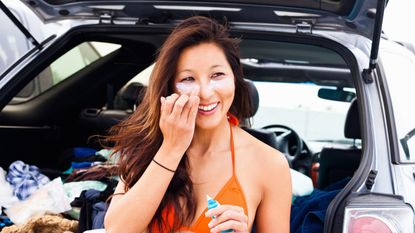

I have a confession to make: Before I developed my meticulous skincare routine (which comes complete with a toner, essence, serum, eye cream, and moisturizer), I tended to skip sunscreen. Because my combination skin is prone to breakouts, particularly during the warmer months, I felt like sunscreens were too thick and greasy for my skin. They often felt like they were sitting in thick, pore-clogging layers atop my skin, and they were a nightmare to layer with makeup. I had no idea that SPFs for acne-prone skin (including several innovative Korean sunscreens and spray sunscreens) even existed.
"There are definitely challenges those with acne-prone skin might when trying to find the right SPF," admits board-certified dermatologist Dr. Sheila Farhang. "Several sunscreen formulations can be thick, especially if they are not specifically formulated for the face, and they can clog the pores, worsening acne. Additionally, some sunscreens can be formulated with comedogenic (AKA acne-causing) oils which can contribute and worsen acne as well."
And my complaints about sunscreen making it impossible to apply foundation? Turns out, I'm not crazy. Dr. Farhang says, "Some sunscreens may cause the skin to look very oily and/or not allow makeup to sit on the skin well. Plus, some sunscreens have chemical sun protecting ingredients that can potentially irritate the skin, causing more inflammation and acne."
But, as I've learned from our Everything SPF guide, not all sunscreens are built alike. There are plenty of sunscreens that work beautifully on acne-prone skin. And since regular use of sunscreen dramatically lowers your risk of developing skin cancer, you should consider making them part of your skincare routine (I sure have).
Below, everything you need to know about finding a sunscreen that keeps your skin both protected and clear.
Why It's Important
As aforementioned, for those with acne-prone skin, the inclination to skip the sunscreen step is particularly tempting. Those who already produce a lot of excess oil might try to mitigate that oiliness by minimizing the amount of product they put on their skin, but Dr. Farhang says that this couldn't be further from the truth.
"Sunscreen is especially important in those with acne because sun protecting minimizes the risk of acne scarring," she says. "Any trauma to the skin—especially for those darker skin—increases excess melanin production when exposed to the sun. This is what a dark acne lesion is (AKA post-inflammatory hyperpigmentation). Wearing sunscreen decreases that excess melanin production caused by the sun after acne or any trauma to the skin."
She adds that if you're using an acne treatment, including an acid (like lactic or salicylic acid) or a retinoid (including retinols like Tretinoin), your skin becomes more prone to sunburn and long-term damage from UV rays, making it all the more imperative that you use a sunscreen whenever you go outside.
What to Look for
We've established that there's a world of sunscreens suitable for those with acne-prone skin, but what are those qualities that make certain sunscreens so good for this skin type?
"Look for oil-free SPF formulations, and other mattifying ingredients that help decrease oil production and also help calm or soothe the skin," says Dr. Farhang. Niacinamide, for instance, helps minimize the appearance of pores, and certain Korean sunscreens boast matte formulas. "Tinted sunscreen may also be nice for those who have active acne or acne scarring to help with aesthetic coverage. Tinted sunscreen also helps further decrease the risk of acne scarring, as it blocks blue light exposure from our screens."
She adds that thinner, non-comedogenic, mineral formulas are ideal for those struggling with acne.
"If there is a sensitivity to chemical sunscreens, a physical sunscreen (AKA mineral) should be used formulated with zinc and titanium," she explains. "It is also important to use a sunscreen on the face specifically formulated for the face—no body sunscreens for the face!" This even includes thinner body sunscreens such as body sprays, she notes.
Best SPFs for Acne-Prone Skin
- Best Lightweight SPF for Acne-Prone Skin: Urban Environment Vitamin C Sunscreen
- Best Cream SPF for Acne-Prone Skin: Clark's Botanicals Invisible Hero Sunscreen
- Best Tinted SPF for Acne-Prone Skin: Revision Skincare Intellishade Matte
- Best SPF for Acne-Prone Skin Overall: Beauty of Joseon Relief Sun : Rice + Probiotics
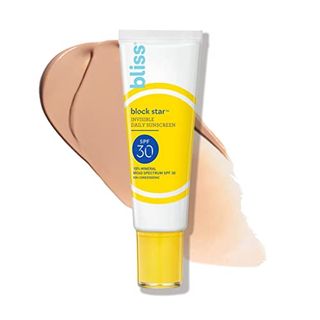
"Bliss Block Star is a clean and affordable option, especially for those with acne-prone skin," says Dr. Farhang. "It is a great everyday sunscreen that is lightweight, non-comedogenic, and 100 percent mineral based. Some additional benefits include the antioxidant blend which helps brighten the skin and help protect it from free radicals, and rosa canina fruit oil, which helps control excess oil while minimizing pores."
Pros: expert-approved; non-comedogenic; mineral formula
Cons: while dermatologists recommend at least SPF 30, SPF 50+ offers the best protection
Customer Review: "This mineral sunscreen has a silky texture, it absorbs & dries very quickly without leaving your skin chalky or greasy looking. It doesn't clog my pores or irritate my skin and it leaves my skin with a matte finish...My skin feels smooth and protected while wearing this sunscreen." -Bliss Block Star
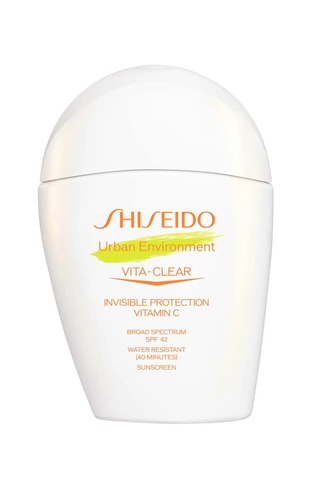
This is the sunscreen that truly changed the game for me. The ultra-lightweight formula is watery, and feels more like an essence than like a sunscreen. As a result, it layers very well under makeup and never leaves a white cast. Formulated with Vitamin C, it visibly brightens skin with consistent use, and protects skin from both UV rays and from the harmful effects of blue light.
Pros: editor-approved; lightweight; protects against blue light
Cons: not optimal sun protection
Customer Review: "Doesn't slip under makeup, very easy to apply, doesn't break me out or anything. Beautiful." -Shiseido
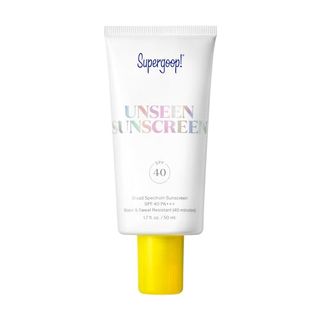
"Super Goop Unseen Sunscreen is a good option for those who want something very lightweight and disappears into the skin as a primer would," Dr. Farhang attests of this popular formula. "It is formulated with Frankincense which helps soothe the skin and Meadowfoam Seed Oil complex which helps moisturize the skin."
Pros: expert-approved; clean; oil-free
Cons: not the highest UV protection possible
Customer Review: "As someone with darker skin, this product is a blessing because it literally (almost) just feels and looks like a silicone primer. It doesn’t give any sort of cast and didn’t break out my super sensitive skin! I don’t wear any makeup on my face (foundation) so I haven’t had any issues in that realm, but I could see this being oily and not good under makeup!" -Sephora
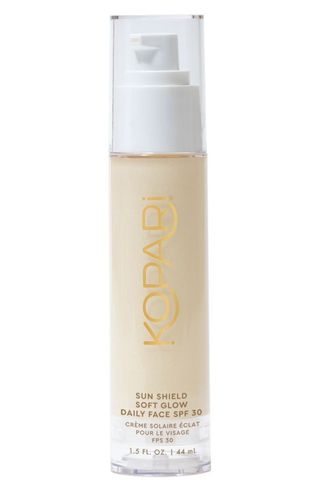
This is another sunscreen I love that has a lightweight texture and a satin finish that layers well under makeup. I also absolutely love it's packaging: The pump makes for simple, quick application, and the airtight container makes it easier than ever to see how much product I have left. Plus, it keeps me from wasting even a single drop of sun protection.
Pros: lightweight; editor-approved; satin finish
Cons: not the most optimal UV protection
Customer Review: "This product is so silky soft and it's the best facial sunscreens I've ever used." -Nordstrom
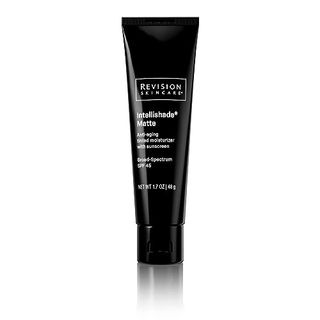
Dr. Farhang raves, "Revision Intellishade Matte, although splurgy, is one of my go-to products. It is a little thicker, so it has more coverage, and the formulation is mattifying, so I recommend it for those with oily skin. It is formulated with peptides, antioxidants, botanical extracts and hydrators so it offers more than just sun protection too."
Pros: mattifying; expert-approved
Cons: more expensive than competitors; thicker formula
Customer Review: "This sunscreen has just a little tint, but it's enough so that I don't have to use a foundation makeup!" -Walmart
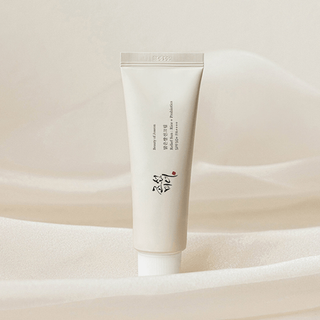
This broad spectrum sunscreen is a popular option from Korean beauty brand Beauty of Joseon. It absorbs well and doesn't clump, no matter how much makeup you layer over it. Its formula includes organic ingredients like rice extract and grain fermented extracts, which speed up skin healing and nourish the skin barrier. Plus, it boasts SPF 50+ and PA++++, meaning that it provides optimal protection from both UVA and UVB rays.
Lightweight cream textureIt is similar to a light moisturizing cream, and it is not sticky or slippery even if you apply it several times.After absorption, it provides a natural glow without a white cast.Even if you apply a large amount before makeup, it does not clump or get cakey.
Pros: organic; lightweight; broad spectrum; works well under makeup
Cons: not a matte finish
Customer Review: "This is the main thing I wanted to try. Love it! I work outside for my job so I needed a great sunscreen that also Hydrates and moisturizes my skin and this does the job!" -Beauty of Joseon
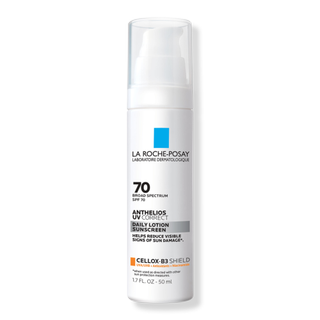
This sunscreen boasts the highest SPF rating on this list, providing maximal protection against UVA rays. Non-comedogenic and made with sensitive skin in mind, it's also perfect for those dealing with breakouts or with scarring. The key to its success among customers? Niacinamide, which evens skin tone and reduces the appearance of scarring and enlarged pores.
Pros: evens skin tone; high UVA protection; contains niacinamide
Cons: slightly thick consistency
Customer Review: "It is more expensive than regular facial sunscreen, but a little goes a long way. I read many articles saying that SPF 70 is unnecessary and that 30 SPF should be enough, and it may be, but I don't mind. My skin looks much better with this one that also has niacinamide. When applying, I usually mix a few drops of facial oil to get a radiant, subtle glow. The consistency is a bit thicker than lotion but not as thick as cream. No particular odor or smell." -Ulta
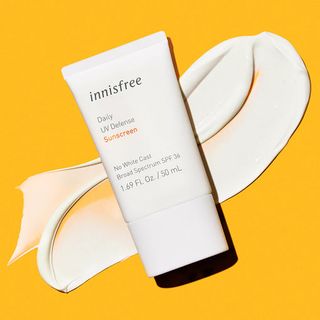
Another affordable Korean option, this broad spectrum sunscreen from Innisfree is perfect for oily and combination skin types. Ingredients like green tea, sunflower seed oil, and cica soothe and nourish skin and repair any damage or hyperpigmentation caused by breakouts or sun exposure.
Pros: broad spectrum; nourishing ingredients; addresses hyperpigmentation
Cons: doesn't have a matte finish
Customer Review: "I was looking for a new sunscreen that laid well under makeup and this is it. The price point is great, it dries clear with a slight dewy finish, and doesn’t pill under makeup." -Sephora
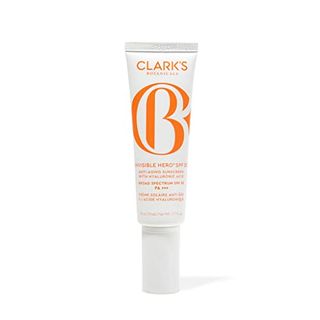
This sunscreen is on the richer, creamier side, but hear me out: It has never broken me out (even on my worst skin days), it doesn't leave a white cast, and it dries beautifully under makeup. With SPF 30 and PA+++, it protects against UVA and UVB rays, so I leave the house confident on even my longest runs on the hottest days of the year. Its pump packaging also makes application a breeze, and it smells fantastic.
Pros: editor-approved; broad spectrum; fights against fine lines; dries matte
Cons: thick formula; UVA and UVB protection could be a bit higher
Customer Review: "The last step before you’re out the door. It’s not too heavy and very clean feeling. Perfect for my oily skin." -Clark's Botanicals
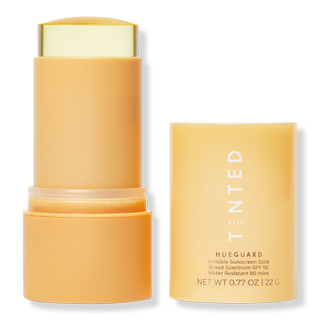
Popular YouTuber Deepica Mutyala founded Live Tinted to enhance representation within the beauty world, and this hero product is one of the most prominent examples of that mission. It's a high-performance sunscreen with SPF 50 that never leaves a white cast—an answer to the prayers of people with deep skin tones everywhere. And because it comes in a stick formulation, it's easy to reapply on the go.
Pros: no white cast; convenient packaging; made with deep skin tones in mind; clean; vegan; cruelty-free
Cons: not a matte finish
Customer Review: "I got this not knowing what to expect and I love it!! No more putting sunscreen on my face and not having it soak in my skin! No more white marks. Love how this doesn't make my skin dry either." -Ulta
Meet the Expert

Dr. Sheila Farhang is a board-certified dermatologist and double-fellowship trained cosmetic surgeon as well as a reconstructive Mohs micrographic (skin cancer) surgeon. “Dr. Sheila” as many know her as, stands out in the dermatology space as she has expertise in both integrative skincare and cutting-edge procedures. She is also highly regarded in the female empowerment space being a founder, CEO, and multi-business owner. Dr. Sheila attended the University of Texas for her undergraduate and medical degrees. Dr. Sheila then completed her dermatology residency at the University of South Florida Department of Dermatology and Cutaneous Surgery. During this time, she augmented her surgical education with additional training with plastic surgeons. Upon completion, she was selected for a position at arguably one of the most competitive programs in the country for dual fellowship at the Skin Institute of South Florida and Hollywood Dermatology in the Miami, FL area. During this time, she also completed a year-long entrepreneur and leadership program through the Advancing Innovation in Dermatology led by Harvard faculty and international industry leaders.
Stay In The Know
Marie Claire email subscribers get intel on fashion and beauty trends, hot-off-the-press celebrity news, and more. Sign up here.

Gabrielle Ulubay is a Beauty Writer at Marie Claire. She has also written about sexual wellness, fashion, culture, and politics both at Marie Claire and for publications like The New York Times, Bustle, and HuffPost Personal. She has worked extensively in the e-commerce and sales spaces since 2020, including two years at Drizly, where she developed an expertise in finding the best, highest quality goods and experiences money can buy. As a film school graduate, she loves all things media and can be found making art when she's not busy writing.
-
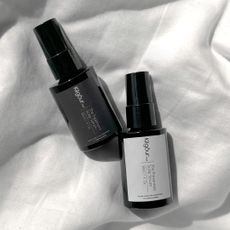 A Healthy Scalp Is the Secret to the Best Hair of Your Life
A Healthy Scalp Is the Secret to the Best Hair of Your LifeSponsor Content Created With KilgourMD
By Emma Walsh Published
-
 Jennifer Lopez Puts Her Navy Outfit Into Overdrive With a Matching Birkin
Jennifer Lopez Puts Her Navy Outfit Into Overdrive With a Matching BirkinIs it really a J.Lo outfit without this particular purse?
By India Roby Published
-
 Will Prince Archie and Princess Lilibet Appear in Prince Harry and Meghan Markle’s Two New Netflix Series?
Will Prince Archie and Princess Lilibet Appear in Prince Harry and Meghan Markle’s Two New Netflix Series?Filming for both shows—about polo and cookery—began this month.
By Rachel Burchfield Published